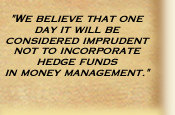|
November 10, 2000
Dear Friend of the Hennessee Group:
As I write this on November 8, we have uncertainty in the Presidential
election and flight to cash out of equities and bonds. Nonetheless,
the markets on October 18 and October 31 coupled with key economic
and political events has led me to this correspondence.
On October 18, the Dow successfully retested its 52 week low set
on March 13 (9742). By falling as low as 9724 but closing over 10,000
for the day. Only 13 days later, on October 31, the market rallied
over 330 points with the advance/decline line turning decisively
positive. All sectors participated in the broad rally signaling
a technical confirmation that the market correction was over. Since
October 18, the Dow is up over 1000 points (+10%) further indicating
that the worst is behind us in equities and the rest of 2000
and 2001 will be a better market than we have seen for the first
ten months of this year.
In short, we have seen the worse of oils' impact on inflation,
consumer spending will continue at a healthy pace, unemployment
will stay around 4%, unit labor cost is not a problem (but has replaced
oil as the wild card), the IPO market has dried up allowing funds
to flow into "real" stocks, and finally the Fed will likely decrease
rates between March and June of next year.
Hedge funds have outperformed through October with the Hennessee
Hedge Fund Index® +9.26% (net of fees) versus the Dow -3.98 % and
NASDAQ -17.78%.
I expect the Dow to end the year at 11,575; the NASDAQ at 3795;
and the S&P at 1500. Our Hennessee Hedge Fund Index ® is forecasted
to end the year up +15.5%.
CONCLUSIONS:
A shift in Asset Allocation from long only equity management
to hedge funds is warranted and should be increased as stock selection
becomes more critical and the number of declining stocks keep pace
with the number of advancing stocks (advance/decline line); giving
opportunity for hedge fund managers to profit from the short side
as well as the long side.
Volatility will continue to dominate the fabric of the market
in 2001 as it did in 2000. As declining growth (third quarter GDP
was +2.7% down from +6.7% for Q2) continues into 2001, further downward
adjustment of PE ratios will occur in stocks and sectors that were
overvalued and priced to perfection.
THE EIGHT "E'S" THAT HAVE PLAGUED THE MARKET MOST OF THIS
YEAR ARE UNDER CONTROL:
Energy: This was a major wild card in 2000, but recent actions
by OPEC indicate that they are determined to get oil down to $28/barrel.
I am still concerned about tight refinery capacity but my sources
have indicated that added capacity can be created within 3 months.
Exuberance: The NASDAQ had a 40% correction (5000 to 3000)
which has deflated a lot of irrational exuberance (50% of all NASDAQ
stocks are down 50%). The Dow and S&P 500 have had stealth bear
markets. In short, speculation has been stymied. Margin is
still too high for my liking but I do not see panic selling due
to margin calls; it has already happened this year.
Most importantly, the markets have performed well technically….
successfully retesting NASDAQ, Dow and S&P lows with solid support
coming in at NASDAQ 3000, Dow 10,000 and S&P 1350. The bubble
in tech stocks has not yet fully deflated since the ratio of the
NASDAQ to broad market averages is still above pre-bubble levels.
Election: Bush may be more favorable for the market than
Gore; especially defense, pharmaceuticals, healthcare, Philip Morris
and Microsoft. But, regardless who wins, the election will be behind
us and the market will have one less uncertainty to deal with; which
will have more of an impact than who actually wins. The Fed monetary
policy is more important than who is President. Whether Greenspan
stays in office is much more important to the market than Gore vs.
Bush.
Euro: We believe the euro will be higher this time next
year and that will be good for U.S. multinationals, as well as,
capital flows back to Europe. I do not know when the inflection
point will occur but politically it behooves all members of the
EMU to get the euro back to $1 US to 1 euro (currently 1 euro only
buys $ .82 U.S.). On January 1, 2002 all of the EMU will convert
to the euro. Everything politically will be done by the EMU to improve
the euro's poor image. The U.S. talks about a strong dollar being
good for the U.S. but a euro at $1 would benefit both U.S. and Europe.
Important to note, 7 out of 10 negative earnings surprises among
by big cap S&P stocks were related to U.S. companies' currency conversion
losses in euro earnings.
I also believe that Europe will begin to outpace the U.S. in productivity
increases beginning the second half of 2001. This will further add
to the strength of the euro.
Fundamentally, I believe Europe will see a reversal of capital
flows. Currently, the euro is depressed partly because of the acquisition
of American companies by European companies. In 2001, I believe
American companies will take advantage of the cheap euro and either
acquire european companies or expand their presence in Europe. I
don't think this reversal will be overdone; the repatriation will
be absorbed by the market. The reduced liquidity will hurt the IPO
market not the spot market.
Also pension plans in Europe are largely in bonds. Political pressure
will be placed on them to invest in equities, which will increase
demand for stocks in Europe, steepen the bond yield curve and strengthen
the euro; which in turn will cause repatriation of foreign monies
invested in the U.S.
Finally, the ECB raised interest rates 7 times in the past 12 months.
I believe Mr. Duisenberg (President of ECB) will raise rates further
from its current level of 4.75% to 5.25% and the U.S. will lower
its Fed funds rate to converge with the ECB rates, which will further
strengthen the Euro against the dollar. Liquidity is still ample
in Europe and Mr. Duisenberg has left the door open to raise again
due to the impact of oil on their economy. Convergence of rates,
between EMU and the U.S., is an element of the G-7 strategy to level
the playing field for all multinational companies and capital markets
within US and G-11.
Evaluations: Have been adjusted to more realistic relationships
between revenue and EPS growth. We still have pockets in technology
that are vulnerable to major corrections, but by and large most
of the correction is done and I believe a base will be formed in
November and December setting the stage for good performance in
2001.
Earnings: On balance, third quarter earnings will be better
than expected. As of this writing, 90% of the S&P 500 companies
have reported. Earnings were up 19% down slightly from the Street
estimates ranging from 20% to 24%. Although growth rates and expectations
are slowing, we have not seen the type of bloodbath that most pundits
predicted. The fundamental environment for stocks is good, not excellent,
but good. Better than this time last year. The key wild cards for
earnings are soft landing vs. hardlanding; inflation vs. productivity.
Economy: The Beige Book Report indicated that the economy's
growth is sound but the pace has slowed and competition is still
keen enough to keep prices down. Little to no recession risk was
inferred. The next move by the Fed will be to cut rates, but they
will lag rather than lead the economic slowdown. This reaffirms
that inflation will stay low. American income rose in September
(1.1%), the fastest pace in more than a year while consumer spending
shot up by the largest amount since February. The overall economy
is slowing but the consumer sector has plenty of momentum.
Employment: The tight labor market that has prevailed for
most of the last five years has been under control and non-inflationary
due to a higher productivity rate than inflation. Inflation remains
relatively tame and wage costs are under control. The employment
cost index rose more gradually in Q3 than Q1 or Q2.
WILD CARDS:
· Bank liquidity (ratio of securities on bank balance sheet to
total bank balance sheet assets) is at its lowest level in nine
years. This has led to tight bank lending standards which if overdone
could slow the economy down too much.
· Credit spreads have widened to highest levels since 1990/91 recession.
Loan default rates are rising. Inability to finance below investment
grade debt could influence a hard landing.
· Market panic centered around falling U.S. equity prices and a
plunging dollar could result in a hard landing.
· U.S. productivity grew at 3.8% rate for the third quarter, slower
than the previous period. The labor department reported that unit
labor costs, a key gauge of inflationary pressure, rose 2.5% in
the third quarter, stronger than the 1.9% rate forecast by most
economists. If productivity does not continue to outpace inflation,
a hard landing could result.
· The dollar is vulnerable to the extremely large trade deficit
(approaching 4% of GDP). A free fall in the dollar could force the
Fed to raise rates as it did in 1987 when the dollar was dumped
against the yen.
Please feel free to call me on any points in this economic briefing.
Sincerely,
Charles Gradante
|












